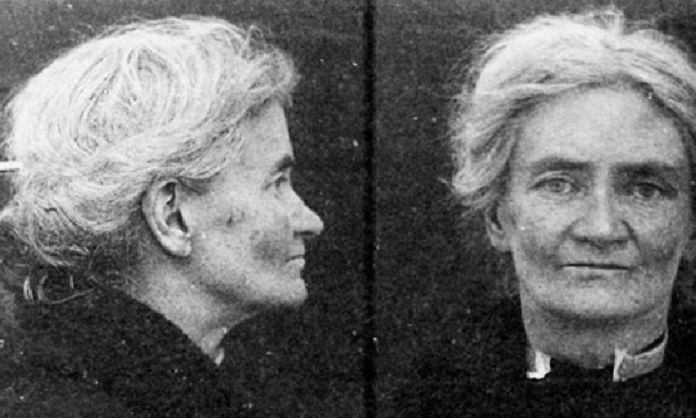By Sean Ryan
An Irish woman who attempted to assassinate one of Europe’s most infamous dictators looks set to be honoured with a plaque in her native city in Dublin. On 7 April 1926 Dublin native Violet Gibson stepped out from a crowd in Rome and fired a shot at one of the 20th century’s most infamous dictators Italian Benito Mussolini.
One bullet grazed the nose of Benito Mussolini, but the Italian leader survived the assassination attempt. Among the many acts of individual bravery against fascism in Europe in the 20th century, Violet Gibson’s has been largely lost to history. Of the four people who attempted to assassinate the leader known as Il Duce, she came closest.

Armed with a rock and a revolver Gibson fired three shots before the gun jammed and was then attacked by Mussolini’s supporters, and only saved by the police intervening and arresting her. After some time in an Italian prison, she was deported to England, something it is suspected might have happened to spare the embarrassment of a public trial in Italy.
She was subsequently kept in St Andrew’s Hospital, a mental asylum in Northampton, until her death in 1956. Indeed such was the world mood at the time that in the days following the attempted assassination, the President of the Executive Council of the Irish Free State W.T. Cosgrave, wrote to Mussolini to congratulate him on his survival.
Gibson was certainly not a likely attacker or indeed assassin if her wealthy background is anything to go by. She was born on 31st August 1876 in Dalkey, Co. Dublin, to Edward Gibson, a wealthy lawyer and politician, and Frances Maria Adelaide Gibson (née Colles), the daughter of a barrister. Violet was the second youngest of eight children: four boys and four girls, and was educated at home, primarily 12 Merrion Square, Dublin, by governesses, with an emphasis on music, singing, art and French. She suffered bouts of scarlet fever, pleurisy and rubella in childhood which left her with a delicate constitution.
When she was nine her father ascended to the lord chancellorship of Ireland and became the first Baron Ashbourne. The Honourable Violet Gibson was presented at age eighteen at Queen Victoria’s court in London, and throughout the 1890s and 1900s her movements were diligently tracked across newspapers’ social columns where she appeared among the lists of high-born attendees at concerts, balls, receptions, weddings and sporting events across Ireland, Britain and the continent.
Violet Gibson was to suffer a series of tragedies in her life which turned her towards religion. In 1905 the first events in a series of tragedies occurred: Gibson’s brother Victor’s new wife died suddenly, then her brother Harry (Henry) succumbed to tuberculosis aged thirty-five. Spending her time in bohemian Chelsea, she met and fell in love with a young artist, and the two became engaged in 1908 but her fiancé died suddenly in early 1909.
Her father later passed away in 1913. His name remains unknown. Following the outbreak of the First World War in 1914 Gibson opposed the war and turned to a number of movements. And her devotion to religion saw her travel to Rome. It was while there in 1926 she performed the assignation attempt on Mussolini which would have no doubt succeeded had the Italian leader not done a head movement at the last second.
Recently Independent Dublin city councillor Mannix Flynn put forward a motion, saying Violet Gibson was a person who “for some odd reason, the Irish establishment, and indeed the British establishment, have totally ignored”. Speaking to the BBC in Belfast he said “Like most people, and particularly women, who have done extraordinary things they are always pushed into the background’’.
He added “If you look at World War One or World War Two, the women were right there with the men. Here and there now we pull the odd thing out of the bag to give them their dues, but it is a rare thing. For some strange reasons, Violet Gibson became some sort of an embarrassment, she got shunned, they tried to say she was insane to hide the shame.”
Violet Gibson’s life was recently featured in Barrie Dowdall’s new film Violet Gibson which first premiered at the Dublin International Film Festival in March 2020.








